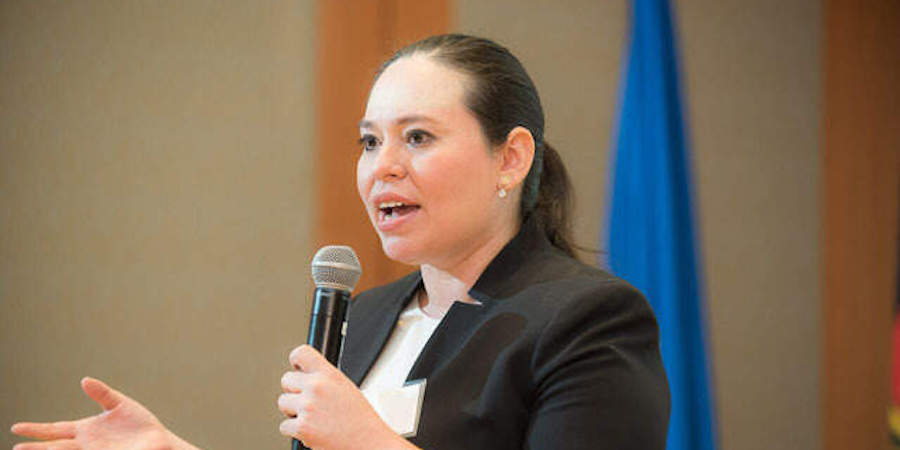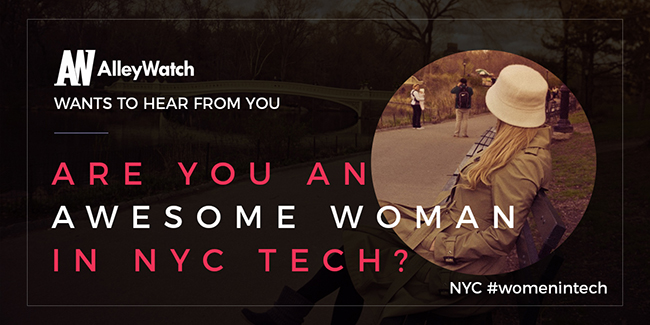This installment of Women in NYC Tech is presented by Kali. Kali is a chemical-free, organic tampon and pads subscription service. Stop using boring, chemical sticks and start caring about your lady parts. Kali – Not Your Mother’s Tampons.
Much has been said and written about the lack of women in the tech sector, be it as investors (or associates), founders, or in management positions at major companies. Is the problem the old boys network – or that success in technology is seen as a young man’s game? In this series, we speak with some of the top women in tech in New York as they discuss the challenges they face, the perceptions that need to be changed and the work that’s being done – or not – to help to promote women in tech.
Today we speak with Dr. Bertha Jimenez, Ph.D and cofounder of Rise, the cleantech startup that turns organic waste into value by converting industrial waste into raw materials. While she attended school in Ecuador, the West Coast and the East Coast, Dr. Jimenez ended up in NYU’s Technology Management and Innovation PhD program and focused her thesis on what she has titled ‘The Entrepreneurial Sandbox’. Dr. Jimenez is currently focused on by-products of the beer and wine industry to be converted into food grade material. Dr. Jimenez is active in the Women in Food Farming and Food Tech group (WiFFFT), and is becoming the role model she wishes she had for young female entrepreneurs.
What’s your background and how did you develop your career as a female entrepreneur in the NYC tech ecosystem?
I recently graduated with a Ph.D. in Technology Management and Innovation from NYU. The focus of my research was on the role of University’s co-curricular programs to develop entrepreneurs. During this time, I observed and participated in multiple student entrepreneurs’ teams. One of the programs I participated was called Global Idea Exchange, an idea competition. It challenged participants to activate modern renaissance in our cities. Given my Mechanical Engineering background, I believe that industries play a big role in improving our cities. Hence, a friend and I submitted an idea about fostering industrial symbiosis. This means that the byproduct of a company could become the raw material of another. Being part of NYU allowed us to meet people that also believed that waste exists because we haven’t found the right application for them. Additionally, by being part of NYC, we had access to many events related to sustainability, entrepreneurship, and social ventures.
We noticed that there are over 40 craft breweries in NYC, and more than 60% are clustered in Brooklyn. The smallest brewery spends at least $400 per month to discard their brewers’ spent grain (BSG). The BSG is the main by-product of the brewery process, and it is just malted barley. It has a high nutritional profile (high protein, high fiber, and low carbohydrate) that could be considered food, and it is currently treated as waste. We started collecting it and realized that we could transform it into flour. We supply our flour to the NYC metropolitan area. There are more than 200 high-end bakeries and chef in our area. Later on, we will expand our market to other urban centers. This market spends approximately $100M per year in ingredients.
By being part of the sustainability ecosystem (in NYC and NYU) and having a great team, allowed us to move from an abstract concept to something that is easy to digest. We realized that there is a significant potential in an industrial symbiosis platform in the United States. As a New York resident, I have a particular interest in, and understanding of, the importance of food in American culture and the culture of New York City specifically. Closing the food loop has tremendous environmental and social implications, but the creation of an industrial symbiosis exchange that generates value from byproducts currently considered worthless also has incredible commercial implications and essentially creates a new commodities market ex nihilo.
 What are the advantages of being a woman in tech?
What are the advantages of being a woman in tech?
I believe that there are not too many women in tech. Research has shown that when there are less of a group working in an environment, attention tends to draw to that group of individuals. It sometimes feels like we are under a magnifying glass. Personally (and I think many women do this), I try to give my best, because I want to be that role model to the future generations. I think being an ethnic and gender minority, I have the opportunity and duty to showcase that women are capable of working and being leaders in any area that we want. Sometimes, the pressure of not having the opportunity to fail keeps me motivated to constantly work hard.
What can be done to further promote female entrepreneurs and women in tech in New York?
I think this question should be rephrased as how could we support STEM in New York. I believe that we can only ask to have a bigger pool of women in tech when we have more women in STEM careers. Studies have shown that since when we are girls, we constantly doubt ourselves as capable of working in male dominated jobs. It is time to change does perceptions, and encourage more girls/women to be part of STEM.
What is diversity to you and do you see it evolving in tech?
Diversity means to have different groups of people in a particular sector. The more diverse is a group, the further it would be for the traditional people that are associated with that sector. For instance, if we are talking about nurses, females will constitute a traditional group. In tech, the tradition will dictate that it would be encompassed by males, from different ethnicities (such as White and Asians). I think it is evolving, and more and more we can observe more females being part of the tech scene. However, I believe it is directly related to women in STEM careers. I think we won’t see a real revolution if we don’t support our girls to be part of the STEM degrees. Girls should be equally motivated as boys to explore, create and discover how much they can do when they are part of STEM.
Why do you think it’s important that women retain, grow, and develop into senior roles within their organizations?
There are two reasons I believe it is important to have women in a senior position, one is diversity, and the other one is to promote women in STEM. I think diversity is a crucial component for innovation. Diversity brings different perspectives, different lenses, diverse backgrounds that can improve the understanding of any organization. Women can bring the diversity that is needed for companies to not only grow but to continue evolving. Furthermore, by having women in senior positions, we are also showing future generations that there are role models for women in STEM. If we want to promote more women in tech, our role models should also be in seniors’ position.
How do you see the future of teams and interactions in a diverse environment and what implications will this have?
I consider myself very fortunate to always be part of teams that embrace diversity. I think that learning has helped me to appreciate diverse perspectives and different backgrounds of people who are working towards a common goal. I believe we can construct, innovate and improve any solutions when we work together and embrace our difference.
How can women rise in the ecosystem and what are the unseen barriers?
Being a woman in the tech ecosystem is hard. Through my career (first as a mechanical engineer, and later on as a female entrepreneur), I have encountered phrases that are detrimental to women. For instance, I heard things like: “But you look so delicate to be a mechanical engineer or that industry is not for you, waste management is just for men, or are you sure you want to work with beer, maybe be an instructor.” Many of the phrases I have faced even in academia when you are supposed to be encouraged not dissuaded not to try it. I think the most important thing I have learned is to be firm in my beliefs. I am also 100% prepared to respond to any challenges that come my way. I think my actions demonstrate that I am capable of doing many things. Of course, I always surround with intelligent people that can help me resolve any issues that I might encounter.
Please tell us about a few organizations that you are involved with or respect that are promoting women in tech.
I am currently part of Women in Food Farming and Food Tech (WiFFFT). This is a group for women working in the various aspects of food – from nonprofit advocacy to food tech to women farmers, chefs, restaurant owners, and food companies. I also work very closely with the cofounder of Change Food, Diane Hatz, a nonprofit social entrepreneur who educates and raises awareness about food and farming. I think she is a great role of model for the food tech area.
What can men do to participate in this discussion?
I think some men are already involved in this discussion when they are allowing and encouraging their daughters, wives, sisters or students to be part of STEM careers or of sectors that are commonly seeing as male-dominated. I also believe that men should also be invited to participate in organizations that promote women in tech. I think that when we (men and women) built things/organizations/missions together, we would have better outcomes.
The team at AlleyWatch believes it’s important to have an inclusive discussion around the challenges facing women in tech along with highlighting the work of the female entrepreneurs that have made NYC one of the best places for women in tech according to some recent studies. That’s why we are running this series that showcases women in tech in New York.
If you are a female founder in NYC working in tech and interested in participating in the series please visit this link or click on the image above.
Please feel free to pass this on to any women in NYC that you feel should be considered for the series. Thank you.







